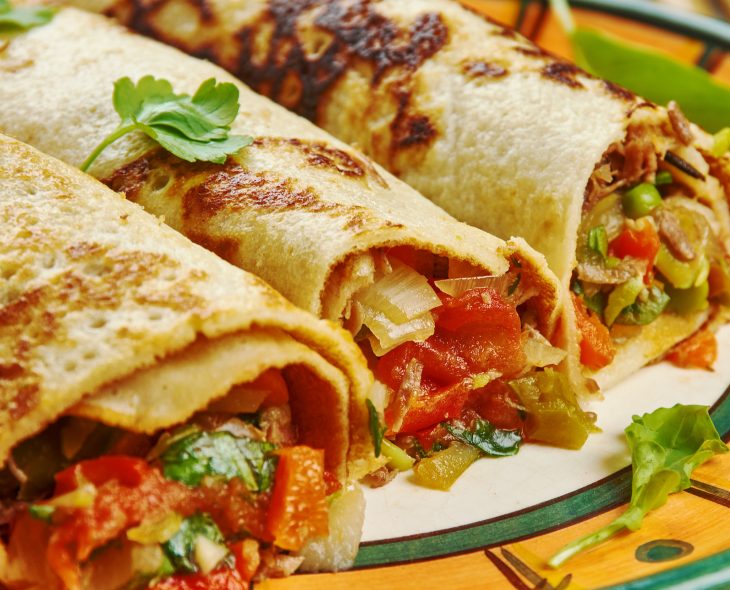
Enchiladas, a popular Mexican dish, have captured the hearts and palates of people around the world. These flavorful and satisfying creations are made by wrapping tortillas around a delicious filling, typically accompanied by savory sauces and toppings. In this article, we will delve into the nutritional aspects of enchiladas, exploring their ingredients, calorie content, and key nutrients. Join us on this culinary journey as we uncover the nutritional facts behind the mouthwatering world of enchiladas.
What are Enchiladas?
Enchiladas are traditional Mexican dishes made by rolling tortillas around various fillings, such as meat, cheese, beans, or vegetables. The filled tortillas are typically covered with a flavorful sauce, such as red or green enchilada sauce, and baked until the flavors meld together.
Caloric Content
The calorie content of enchiladas can vary depending on the size, ingredients, and preparation methods. On average, a single enchilada may contain around 200-400 calories, but this can be higher or lower depending on the specific recipe and serving size.
Carbohydrate Content
Enchiladas are primarily made with tortillas, which are a source of carbohydrates. The exact carbohydrate content can vary depending on the type of tortilla and fillings used
Fat Content
The fat content in enchiladas can vary depending on the fillings and toppings used. Cheese and sour cream are common sources of fat in enchilada dishes. The fat content can range from 10 to 20 grams per serving.
Protein Content
Protein content in enchiladas varies depending on the fillings. Meat-based fillings like chicken or beef provide a good source of protein. Protein content can range from 10 to 20 grams per serving.
Essential Vitamins and Minerals
Enchiladas can contribute to your intake of essential vitamins and minerals depending on the ingredients used. Vegetables, such as bell peppers, onions, and tomatoes commonly found in enchiladas, provide vitamins A, C, and K, as well as minerals like potassium and folate. Beans, a popular filling choice, are a good source of dietary fiber, protein, and minerals like iron and magnesium. Dairy products like cheese and sour cream provide calcium, which is essential for bone health.
Sodium Content
Enchilada sauces and some fillings may contain added salt, contributing to the overall sodium content of the dish. It is important to be mindful of sodium intake, especially for individuals with high blood pressure or other health conditions that require a low-sodium diet.
Fiber Content
If made with corn tortillas, enchiladas can be a good source of dietary fiber. Fiber aids in digestion, promotes feelings of fullness, and helps maintain healthy cholesterol and blood sugar levels.
Antioxidant Boost
Enchiladas prepared with ingredients like tomatoes, bell peppers, and onions can offer a good dose of antioxidants, which help protect the body against harmful free radicals.
Versatility for Dietary Preferences
Enchiladas can be easily customized to accommodate various dietary preferences and restrictions. Options for vegetarian, vegan, gluten-free, or dairy-free enchiladas make it accessible to a wide range of individuals.
Final Word
In conclusion, enchiladas offer a delightful culinary experience with a range of flavors and ingredients. By being mindful of portion sizes and the choice of fillings, enchiladas can be enjoyed as part of a balanced diet. The nutritional profile of enchiladas can vary depending on the ingredients and preparation methods, but they can provide a good source of carbohydrates, protein, vitamins, and minerals. So, the next time you savor the taste of enchiladas, relish not only the flavors but also the nutritional benefits they bring to your table.
Frequently Asked Questions (FAQs)
Can I make enchiladas with gluten-free tortillas?
Yes, there are gluten-free tortilla options available, such as those made from corn or other gluten-free grains. Check the packaging or look for specific gluten-free tortilla brands.
Are enchiladas suitable for vegetarians?
Enchiladas can be easily customized for vegetarians by using vegetable fillings, such as beans, cheese, or roasted vegetables. Ensure that the sauces and toppings are also vegetarian-friendly.
Can enchiladas be part of a healthy diet?
Enchiladas can be enjoyed as part of a balanced diet when prepared with nutritious fillings, whole grain tortillas, and portion-controlled servings. Opting for homemade sauces and reducing the amount of high-fat toppings can also make them a healthier choice.
Are there low-fat alternatives to traditional enchilada fillings?
Yes, there are several low-fat alternatives that can be used as fillings, such as lean meats (like turkey or chicken breast), grilled vegetables, or legumes.
Are enchiladas spicy?
The level of spiciness in enchiladas depends on the choice of sauces and spices used. They can be mild or hot, depending on personal preference and the specific recipe.
Was this page helpful?
Our commitment to delivering trustworthy and engaging content is at the heart of what we do. Each fact on our site is contributed by real users like you, bringing a wealth of diverse insights and information. To ensure the highest standards of accuracy and reliability, our dedicated editors meticulously review each submission. This process guarantees that the facts we share are not only fascinating but also credible. Trust in our commitment to quality and authenticity as you explore and learn with us.
